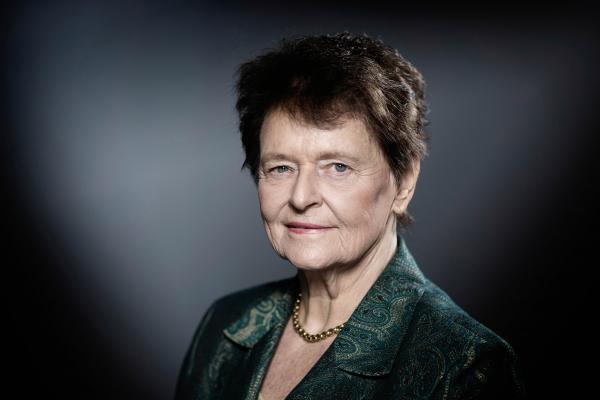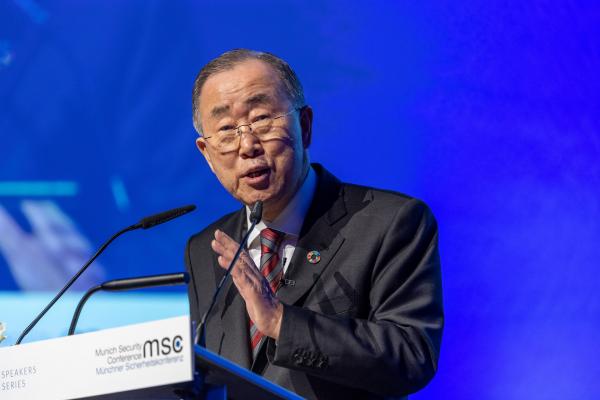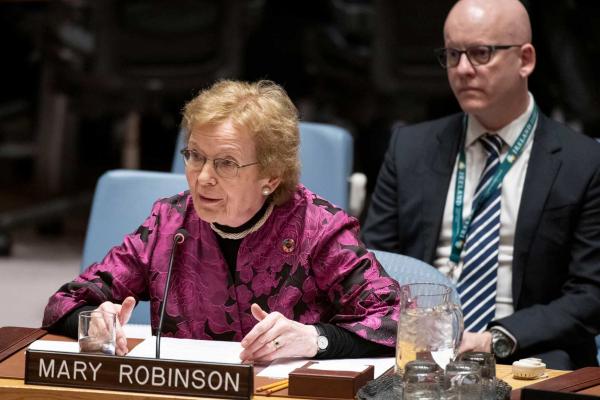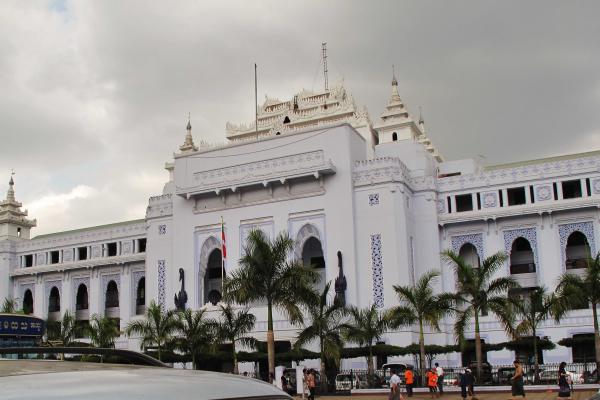Multilateralism is not an option, it is the only path

Mary Robinson outlines The Elders' defence of multilateralism at a virtual event to mark the 75th anniversary of the UN Charter.
This speech was delivered at "The UN Charter at 75: Multilateralism in a fragmented world" - A Virtual High-Level Forum to Commemorate the 75th Anniversary of the United Nations on 10 June 2020. The event was organised by Singapore in its capacity as Chair of the Forum of Small States (FOSS) in partnership with The Elders.
Excellencies,
Honourable Minister Balakrishnan,
Honourable President Muhammad-Bande,
Honourable Secretary-General Guterres,
Ladies and Gentlemen,
It is a pleasure and a privilege to join you virtually for this most timely event.
In these times of grief, anger and despair, it is critical that those of us who believe in the values of justice, human rights and the rule of law continue to speak out.
We need to defend those institutions which provide us with the best hope of realising our collective human potential, and reaffirm our commitment to the abiding promises and values enshrined in the Charter of the United Nations.
Coming from a small state myself, I feel somewhat at home in this company.
So I am profoundly grateful to the Permanent Mission of Singapore and the Forum of Small States for the invitation to address this virtual high-level forum on the seventy-fifth anniversary of the United Nations.
The crises we are living through at the moment – COVID-19, the associated prospect of sustained economic slowdown and high unemployment, the climate emergency, entrenched and systemic racism, gender inequality and oppression – are all too complex and multi-faceted for any one nation to tackle them on its own.
Multilateralism matters to all states, big or small. We need to see it as a lifesaver, as the UN’s founders envisioned back in 1945 with their determination to “save the world from the scourge of war”.
But in recent years, the system of institutions, regulations and norms built up over the past seventy-five years has been subject to sustained and deliberate attack.
This is myopic and self-harming. A regression from a rules-based system into power-based strategies will not result in a safer, more predictable or propitious environment for any country.
This is why The Elders – the group of independent global leaders founded by Nelson Mandela in 2007, of which I have today the honour to be Chair – have produced a new report on the nature of contemporary multilateralism, and how it can be defended and strengthened both in today’s challenging climate, and in the years and decades ahead.
Our report begins with the recognition that multilateralism and respect for a global rules-based system has underpinned peace, security, health and prosperity across large swathes of the world for the past seventy-five years.
The UN embodies these principles and remains an indispensable actor in facing contemporary existential threats from pandemics to climate change and nuclear proliferation.
In January of this year, I travelled to Washington DC with Ban Ki-moon, former UN Secretary-General and today Deputy Chair of The Elders, to participate in the unveiling of the “Doomsday Clock” maintained by the Bulletin of the Atomic Scientists as a measurement of existential global threats.
The hands of the clock were moved forward to 100 seconds to midnight, the narrowest setting ever since its first unveiling in 1947, because of the acute threats posed to the future of humanity by the climate crisis and the escalation of a new arms race between the nuclear powers.
Even though COVID-19 now rightly commands our attention, these other threats have not gone away.
In recent weeks, we have seen further alarming moves by the United States that weaken the global architecture of arms control and non-proliferation, including its announcement that it intends to withdraw from the Open Skies Treaty, and even reports that it has been considering a resumption of nuclear testing.
These decisions demand an urgent and robust response, and no responsible leader can claim that COVID-19 provides an excuse for inaction on the nuclear front. All states should exert whatever pressure they can to convince the US Administration to agree to extend New START for five years; its expiry would mean there was no binding agreement on arms control between the two nuclear superpowers – the US and Russia – and thus a severe risk to global peace.
2020 should have also been the occasion for the Non-Proliferation Treaty Review Conference, which had to be postponed due to COVID-19. The NPT is critical both in preventing nuclear proliferation and moving towards the ultimate elimination of all nuclear weapons.
All parties to the Treaty should not waste the time afforded by this postponement but take concrete steps to meet their obligations on disarmament. Those bearing the heaviest responsibility are of course the five Permanent Members of the UN Security Council, who I regret to say have consistently failed to live up to their obligations on disarmament under Article 6 of the NPT.
It remains inevitable of course that debates on the future of multilateralism need to be reassessed and reframed in light of our collective experiences to date of this devastating pandemic.
COVID-19 knows no borders and pays no heed to national sovereignty. It has swept through every part of the world since the beginning of 2020, leaving a devastating cost; first and foremost in human lives, but also in terms of economic growth, political momentum and social inequality.
This terrible pandemic is a test of our common humanity. We can see how it is exacerbating existing profound socio-economic, racial and gender inequalities, both within and between countries.
Only a coordinated multilateral response can deliver testing and a vaccine at scale, and only a renewed commitment to the values and institutions of the UN can enable us to build back better and protect the rights and dignity of all global citizens.
A global crisis demands a global response. Yet the virus has struck at a time when the multilateral system was already under attack from populists, nationalists and isolationists.
COVID-19 will not be overcome unless states work together, pooling resources and expertise to strengthen health systems, support the vital work of the World Health Organization and encourage a spirit of solidarity.
The initial response of Chinese authorities to obfuscate and dissemble over the origin and scale of the pandemic was regrettable and hindered a prompter and more effective global response. Preventing the emergence and spread of infectious disease is the pre-eminent example of a “global public good”, and merits unprecedented international cooperation by governments and policymakers. In a pandemic, no-one and no country is safe until everyone and every country is safe.
COVID-19 exposes the intersectionality between health, poverty, gender, race, marginalisation and disability. At the same time, many countries whose governments are led by women have been noted to manage the virus better, and many of the jobs which have been revealed to be essential during the pandemic – from health and social care to low-paid services – are predominantly held by women.
It is also noteworthy that many small states, including some countries represented here today, have proven themselves to be more nimble and efficient in their response to COVID-19 than their larger neighbours, often because they have collaborated quickly and effectively in their regions.
It will be essential as we emerge from the crisis and ‘build back better’, that the recovery in all states is aligned, as the Secretary-General has urged, to the 2030 Agenda and the Paris Climate Agreement, and that the commitment to gender equality and parity of decision-making is at its core.
An effective, rules-based multilateral system is the world’s insurance policy against existential threats from pandemics to climate change and nuclear weapons, and we now know the awful cost of failing to provide comprehensive cover.
The network of international covenants and institutions agreed and constructed since the end of the Second World War, with the United Nations at its core, is far from perfect. But it has nevertheless decisively supported the pursuit of peace, security and the protection of human rights, as well as economic and social improvements, around the globe, for over seven decades.
Yet sadly in recent years, the United States – the world’s leading superpower and the country hitherto regarded as a key guarantor of this global rules-based system – has deliberately weakened it across several fronts: from climate change and nuclear non-proliferation to respect for human rights, free trade and health security.
But effective multilateralism is in the national interest of all countries, regardless of size or strength. Cooperating by means of internationally-agreed mechanisms is less costly and more reliable than using unilateral force.
Actions that weaken multilateralism are damaging in themselves, and also embolden other leaders with isolationist or nationalistic leanings. We have already seen instances of leaders using the Covid-19 crisis to weaken democratic safeguards and human rights, in countries as diverse as Hungary, Israel and The Philippines.
The alarming violence across the United States in the wake of the murder of George Floyd serves to remind us that even long-established democracies can be fragile and vulnerable in these times of crisis. Yet it has been heartening to see large marches, both peaceful and diverse, in the United States and around the world against racism in all its forms.
Racism is a stain on the human conscience, and COVID-19 has highlighted how people of colour continue to bear a disproportionate socio-economic burden in health crises which is then exacerbated by systemic discrimination, prejudice and violence from state authorities.
Militarised policing, the targeting of journalists and inflammatory rhetoric from political leaders not only fans the flames of protests, it corrodes citizens’ faith in the institutions of power and justice, and weakens the capacity of responsible politicians to tackle the root causes of the crisis.
Those of us who have never experienced racial discrimination at first-hand have a particular responsibility to react to this suffering with humility, empathy and understanding. The international system as a whole, including the United Nations, must do more to acknowledge the discrimination faced by minority populations around the world and advance concrete solutions to further the cause of equality and justice.
The hard months and years ahead will require determined and principled leadership at every level in every nation. Multilateralism is not an option: it is the only path that can deliver a green, sustainable and equitable recovery.
Today’s crisis reveals fundamental truths about what it is to be human, to live and to die, and to share our lives with others. The great Irish poet Seamus Heaney captured these truths in his reworking of Sophocles’ Greek myths, and I believe this spirit can guide us through our contemporary troubles and lead us to a brighter, fairer future:
“So hope for a great sea-change
On the far side of revenge.
Believe that a further shore
Is reachable from here.”
Thank you.









